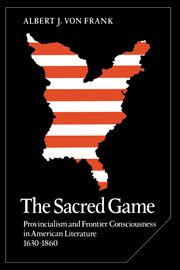Book contents
- Frontmatter
- Contents
- Dedication
- Preface
- Introduction: provincialism and the frontier
- 1 “But enmity this amity did break”
- 2 Brother Jonathan
- 3 “A musy in the thicket”
- 4 Geoffrey Crayon and the gigantic race
- 5 Hawthorne's provincial imagination
- 6 Working in Eden
- 7 Life as art in America
- 8 Reading God directly: the morbidity of culture
- Postscript: tradition and circumstance
- Notes
- Index
Introduction: provincialism and the frontier
Published online by Cambridge University Press: 07 October 2011
- Frontmatter
- Contents
- Dedication
- Preface
- Introduction: provincialism and the frontier
- 1 “But enmity this amity did break”
- 2 Brother Jonathan
- 3 “A musy in the thicket”
- 4 Geoffrey Crayon and the gigantic race
- 5 Hawthorne's provincial imagination
- 6 Working in Eden
- 7 Life as art in America
- 8 Reading God directly: the morbidity of culture
- Postscript: tradition and circumstance
- Notes
- Index
Summary
The frontier is the line of most rapid and effective Americanization. The wilderness masters the colonist. It finds him a European in dress, industries, tools, modes of travel, and thought. … It strips off the garments of civilization. … It puts him in the log cabin … and runs an Indian palisade around him. Little by little he transforms the wilderness, but the outcome is not the old Europe, not simply the development of Germanic germs. … The fact is that here is a new product that is American. … Thus the advance of the frontier has meant a steady movement away from the influence of Europe, a steady growth of independence on American lines.
– F. J. TurnerThe early history of American culture is overwhelmingly the story of civilization moving westward, and hardly at all the story of its springing up spontaneously on the frontier. The more or less contrary position – that the frontier was an agent of abrupt cultural change, or a “gate of escape from the bondage of the past”–was advanced with intentional exaggeration by Frederick Jackson Turner in 1893 and has since achieved an almost mythic hold on popular conceptions of American history.
- Type
- Chapter
- Information
- The Sacred GameProvincialism and Frontier Consciousness in American Literature, 1630–1860, pp. 1 - 10Publisher: Cambridge University PressPrint publication year: 1985

